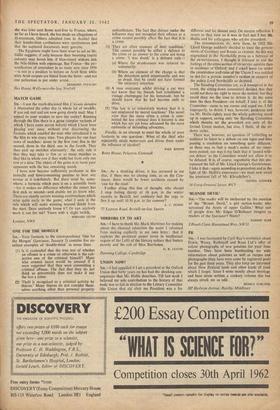SIR,—I feel appalled it I set a precedent at the
Oxford Union that forty years on has had the shocking con- sequences that Mr. Hollis describes. Till last week I believed my sole contribution to the history of that body was to fail in election to the Library Committee (the Union that did elect me President was a far
different and far distant one). On mature reflection I revert to that view as it was in fact not I but Mr. Hollis and his colleagues who set the precedent.
The circumstances, sir, were these. In 1922 Mr. Lloyd George suddenly decided to treat the govern- ments of Germany and Russia as existent. As this was stigmatised in the Northcliffe press as a betrayal of the evserviceman, I thought it relevant to test the feelings of the cross-section of ex-service opinion then in residence at' Oxford; and I asked leave (as under the constitution and rules of the Union I was entitled to do) for a private member's motion in support of the policy Lord Northcliffe so detested.
The Standing Committee (or. as it transpired in the event, the sitting-down committee) decided that they could not deny my right to move the motion, but they could deny me the time to debate it. At the same time the then President—on behalf, I take it, of the Committee—came to my rooms and urged me, I felt improperly, to desist. I was, however, persistent and (as Mr. Hollis rightly says) the whole gathering stood up in support, saving only the Standing Committee which thereby set the precedent not only of the formal Union motion, but also. I think, of the sit- down strike.
There was, however, no question of 'collecting an audience to listen to a debate on one topic and. then passing a resolution on something quite different,' as there was in fact a week's notice of my inten- tions posted; nor was it my fault that it 'passed with- out debate' as the Committee would not allow it to be debated. It is, of course, regrettable that this pre- cipitated the fall of'Mr. Lloyd George's Government. 1 take it that—again according to precedent and in the light of Mr. Hollis's experiencewe must now await the imminent fall of Mr. Khrushchev's.
GEORGE EDINGER






































 Previous page
Previous page